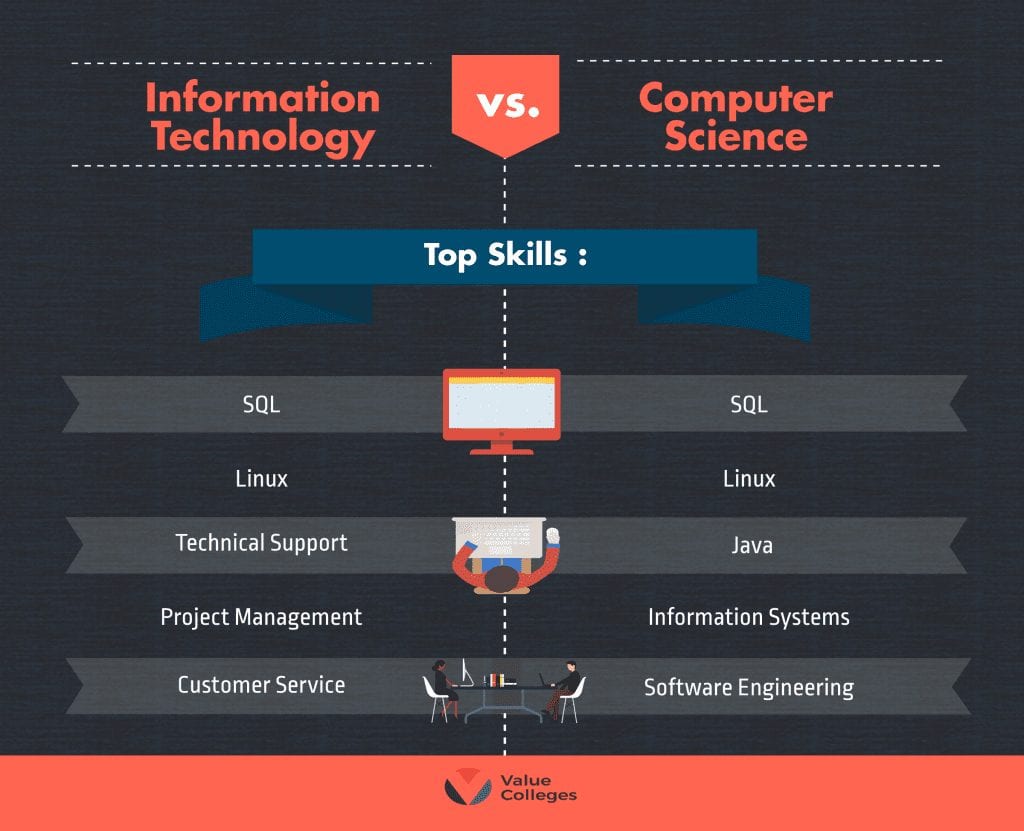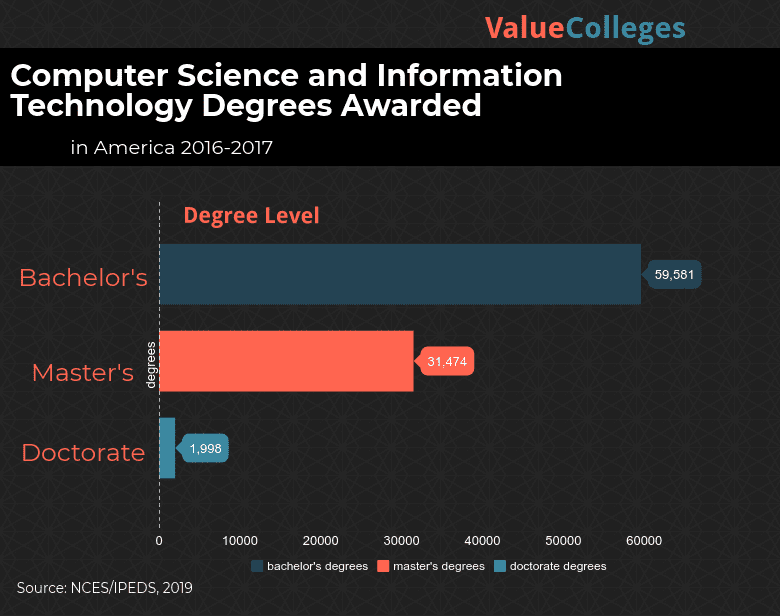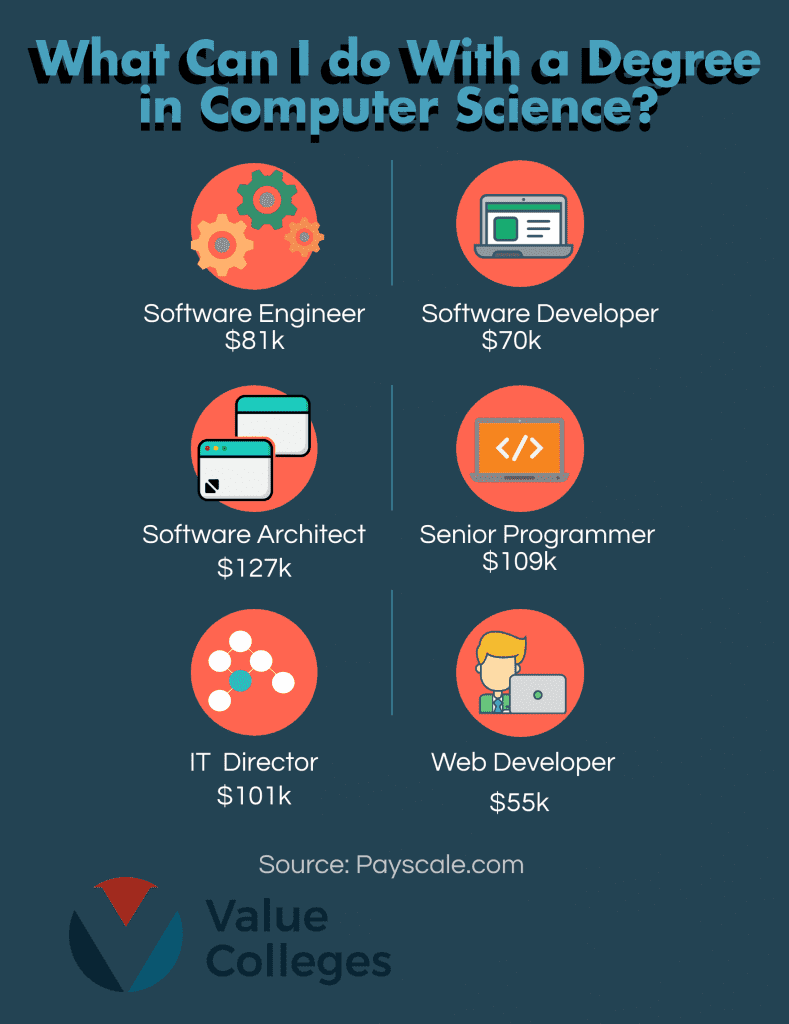Computer Science & Information Technology Degrees: What Can I Do With a Computer Science Degree?

Find your perfect value college

When you’re considering a career or a career change, there are a few ways to look at it.
What will make the most money fastest?
What will give me the most flexible schedule and convenient workplace?
What will be the most secure?
Computer Science and Information Technology are some of the best all-around choices for answering all those questions.
You may not become a billionaire in computer science. There are only so many Steves Jobs and Bill Gates in the world. But, since it’s specialized knowledge and challenging skills, salaries tend to be solidly high. Employees in computer science and information technology can work in all kinds of locations, from laboratories to high-rise offices to their bedrooms. And the work itself can be very flexible.
As for security? Every business and industry depends on computer technology today. An expert in computer science may not always have the job they want, but they’ll always have a job.
But Computer Science and Information Technology is more than knowing how the technology works. It’s the way computers and people come together. The job of computer programs, ultimately, is to figure out how to make computer technology work most effectively, whether it’s speeding up processing or making interfaces more user-friendly. It’s a career that can be just about anything you want it to be. It has a broad base of knowledge and experience and essentially no limits.
(check out: Is a STEM Degree a Good Investment?)
Is a Computer Science Degree Worth It?
Before entering an information technology program, you might wonder if a computer science degree is worth it. Over the last 20 years, the computer science field has grown exponentially. The median wage is $86,320 annually, according to the Bureau of Labor Statistics. Jobs in the industry are expected to experience a growth of at least 14% over the next decade. As many as 557,000 new jobs will be created. This figure indicates a faster than average rate when compared to all other occupations.
A computer science degree is worth it since technology is consistently evolving. New specializations are always opening in the field of computer science as new technological advancements are made. For instance, careers related to virtual reality and augmented reality have experienced a surge in job openings over the past several years. Big data and cloud-related job positions are expanding. Companies are looking for IT specialists with experience in these areas.
An information technology degree is worth it—especially if you choose a program that’s a bachelor’s level or higher. Associate degree programs are acceptable for entry-level positions, but top-paying jobs will usually need a bachelor degree at a minimum. An associate degree is usually best for those who are still exploring their options and have yet to commit to a field of study. Associate IT degrees are also useful for earning credits toward a bachelor degree or higher.
Potential job opportunities for computer science degree holders include:
- Application developer
- Computer programmer
- Database administrator
- Information security analyst
- Network architect
- Software developer
- UX designer
- Web developer
Several jobs in the computer science field will have a master’s degree requirement. For these jobs, median salaries will be upwards of $115,000 per year. Job titles for master’s level information technology jobs are:
- Chief technology officer
- Chief information officer
- Computer research scientist
- Information technology consultant
It is possible to launch a career in the field of computer science with an associate degree. Associate degree programs will teach students both hard and soft skills needed for the IT workforce. Computer support specialists and network systems administrators can be hired with an associate degree. These employees usually handle general issues with computers and networks. The positions are ideal for entry-level professionals looking to gain vital on-the-job experience. In some incidences, an employer may not even ask for a college degree. They might look exclusively at job experience and any certifications earned related to computer science.

Jobs may ask for certifications to screen for qualified candidates. Certifications demonstrate that the applicant is skilled in a particular technical area. Degree programs may include certifications as part of their curriculum. If a current employer needs the worker to learn a new skill, the business will usually reimburse for any certification programs. Colleges and professional organizations usually sponsor information technology certifications. Certifications may include coursework that can be reviewed before a final exam. To receive the certification, a passing grade on the exam is needed.
Computer science degree programs are being offered more and more online. Online degrees are widely accepted as long as they are earned from an accredited college or university. Students should always check accreditation before choosing a degree program. ABET accreditation is an important part of selecting a college for a STEM-related job. ABET accreditation is available for associate and bachelor’s degree programs for select technology majors.
School and Program Accreditation for Computer Science and Technology
Any school a prospective computer science student chooses should have the proper accreditation in order to find a position post-graduation. Accreditation means that the college’s degree program has been reviewed and meets the board’s requirements. The accreditation process usually involves reviewing:
- the degree’s curriculum
- staff members
- post-graduation outcomes
Accreditation is especially important for distance learning programs. An accredited computer science degree online will have the same value as a traditional program. Non-accredited programs may disqualify the applicant from a position. Moreover, employers are wary of bogus degrees that are being peddled online. If a degree program is advertised as “free,” then the degree given is likely counterfeit.
There are both regional and national accreditation agencies for colleges and universities. Regional accreditation is considered the gold standard for higher universities. However, national accreditation is usually seen in trade and vocational colleges. Regional informational technology accreditation degree programs will be eligible for reimbursement through corporations.
Also, regional accreditation helps confirm that any credits earned through the program will be accepted as transfer credits. Each area of the United States will be assigned a regional accrediting agency. The following are frequently asked questions regarding computer science accreditation:
What is ABET Accreditation?
ABET stands for the Accrediting Board for Engineering and Technology. ABET has been around for more than 80 years and has a team of 2,000 professionals who evaluate different STEM programs around the country. Instead of the college being accredited, ABET accredits the actual program. ABET accreditation is used to determine whether a technology program will prepare students to enter a STEM industry. ABET accreditation advantages include increased educational opportunities and more job openings. ABET has a database available where prospective applicants can look for companies that only want to hire those who have graduated from an ABET program.
ABET accreditation also ensures a student is eligible for federal and state loans and grant programs. Non-accredited programs are not usually eligible for any government funding. Private scholarships usually also require some form of accreditation. Colleges are ABET-accredited if the programs have proven to produce positive post-graduation outcomes and promote best practices in education. ABET accreditation requirements include that the program is housed in a degree-granting school. ABET-accredited online schools are available for those who need distance learning opportunities. Online programs have a separate accreditation process from traditional computer science and engineering types.
Is ABET Accreditation Important for Computer Science?
Many employers are now requiring new hires in the field of computer science to have graduated from the ABET-accredited programs. The STEM field is looking for a global standard to determine if college graduates have the technical prowess to succeed in the industry. ABET programs confirm job readiness for computer science students. Along with computer science programs, ABET accredits engineering and applied/natural science programs. Computer science programs are only accredited at the four-year level. Associate engineering and applied science programs can qualify for accreditation.
Graduates of ABET programs do not need to apply for any certification or licensing since accreditation is automatically awarded to graduates of the program. Vocational programs and doctoral degrees are not eligible for ABET accreditation. ABET programs are reviewed on a regular basis to guarantee the board’s high standards are consistently being met.
What Other Types of Information Technology Accreditation are Significant?
Information technology accreditation will vary from state to state. For instance, colleges located in southern states are typically accredited by the Southern Association of Colleges and Schools, Commission on Colleges. The Northwest Commission on Colleges and Universities is in charge of accrediting programs located in states located in the Northwest.
ABET accreditation is the most significant for STEM programs, but regional accreditation should be in place as well. When looking at college catalogs and websites, accrediting information should be easy to locate. Once you locate the name of the accrediting agency, you can research what type of standards the board requires. National accreditation has less rigorous standards and are usually found at for-profit schools. Some colleges may have both national and regional accreditation.
Types of Computer Science Degrees
Computer Science and Information Technology offer something for everyone at every academic level.
A web developer with just an associate degree can expect to make an average of $62,000 annually according to current BLS statistics. A computer network architect with a bachelor’s degree under her belt can expect about $91,000 annually
CIT programs are available at both the Associate and Bachelor levels. According to the U.S. Department of Labor Bureau of Labor Statistics, it is projected that jobs in computer technology will grow at more than four times the rate of all industries through 2022.
(check out: What is the Benefit of Going to a Community College?)
AA/AS: Many people are completely content to complete an associate degree, since jobs are readily available even at this level. Salaries range from $35,000 to as high as $80K. An associate’s degree from a community college, often augmented with a specialized certification or licensure, is all you need to open the door as a:
- tech support specialist
- web developer
- coder
BA/BS: These include more specialized jobs with higher status and more responsibility, such as:
- analysts
- administrators
- designers
These usually require a bachelor’s degree. Since the need for qualified workers is so great, employers make little distinction between:
- BS degrees (which are geared toward engineers)
- BA degrees (which are less strictly scientific).
The difference depends on whether you want to focus more on the hard science of computers and technology, or on the design and management side.
MS: Master’s degrees can be technical or managerial, depending on what direction students want to take in their careers. They are usually necessary for the higher-ranked jobs, especially leadership positions such as project management. If a job title has Engineer in it, you’re probably going to need a master’s to get it.
PhD: As in most fields, a PhD in computer science is for those who want to teach at the college level, or who just love going to school so much they can’t stop. It’s not really a necessity for most corporate or industry jobs, and can even be a liability on the job market for everything but teaching.
There are many types of information technology degrees to consider when choosing a career in computer science. The most popular type to start with is a bachelor’s in information technology. The degree may also be referred to as a bachelor’s in computer science. A bachelor of science in information technology gives students a strong foundation in the field. Courses for a bachelor’s in information technology degree will include:
- information technology fundamentals
- computer systems security
- computer networks
- IT systems planning
- scripting
Computer science degree requirements will also include general education classes in:
- math
- history
- philosophy
- writing, and more.
A bachelor of information technology syllabus is different at each college. However, most universities offer elective options for students to take classes in their preferred specialization.
Students should look at specialization options as well as accreditation to narrow down the best undergraduate computer science schools. In the fundamental courses, students will be exposed to a wide variety of:
- networks
- hardware
- software
- applications
A student earns a BA in information technology once he or she has completed 120 program credits and will usually be done in four years.
An IT associate degree online could be useful in preparing for a bachelor of science in information technology program. In many cases, you will be able to apply the online information technology degree credits to a higher degree. Colleges accept credits earned from both online and traditional degree programs as long as regional accreditation is in place. An IT associate degree online will likely only require 60 credits and can be completed in less than two years. Associate degree courses will cover similar topics as bachelor degree classes. Associate degrees are also useful for meeting general education requirements before attending a four-year college. An IT associate’s degree online may be more affordable than taking general education classes on-campus at a four-year college.

A master’s in information science and technology degree will train you in one certain area. Instead of a general overview, the master degree program will delve into advanced computer science topics. Usually, information technology online schools are a top choice for graduate students since you may have already started working. A technology firm could choose to send employees for a computer science degree online.This allows the employee to take courses in the evenings and on weekends.
Online information technology courses are the same as traditional courses with:
- lectures
- research papers
- examinations
Types of computer science degrees at the graduate level include:
- database systems
- homeland security
- software engineering
- telecommunications
- informatics
A master’s online information technology degree is conferred after all course requirements are met. The college may need 35 credits or more completed in the core courses before graduation along with a potential internship or thesis requirement. An online master’s degree program could accept transfer credits toward credit requirements. Any accepted credits will be at the discretion of the admissions department. An online IT degree program will usually offer an accelerated track for those who wish to graduate sooner. Accelerated computer science degree programs may be finished in one year or less, but have a larger per semester course load.
Doctoral information technology degree programs are available. Those who earn a PhD usually become educators or trainers in the field. Like other degree options, online information technology degrees are available from accredited universities.
To earn an information technology degree, you will have several options to choose from. Computer science degree types include traditional, hybrid, and online. Traditional degree tracks require that students attend courses exclusively on campus. A hybrid IT degree program will include both online classes and in-person lectures. Online computer science degrees are 100 percent online. In some cases, you may only have a weekend campus visit requirement once or twice a year. Online colleges offer many of the same services as traditional colleges—not limited to career counseling and networking opportunities. Online classes have flexible times. But they still have strict deadlines.
Online vs. Residential Programs
Computer science is an interesting discipline in the sciences. It is very hands-on. But the hands-on aspect doesn’t necessarily require being in a laboratory or controlled environments. Most aspects of computer science can be learned anywhere. This means that there’s nothing inherently better about a traditional residential program than an online program.
(check out: Are Online Degrees a Good Investment?)
However, there are some other possible perspectives. With most disciplines, it’s best to get an undergraduate degree on campus. This allows more access to guidance and help from peers and faculty. A residential master’s program can also have the advantage of making connections that will help in the job market, such as internships and networking with the university’s corporate partners. Ultimately, though, with computer science the difference between a residential and online program really depends on how you learn best. If you need human support and guidance, go residential. If you just want the skills and don’t need the people, online may be just as good.
Most Affordable Programs
Top 10 Most Affordable Online Master’s Information Systems Assurance and Security
Best Value Residential Rankings
Top 50 Best Value Undergraduate Schools
Top 50 Best Value Graduate Schools of 2015
Best Value Online Rankings
Top 50 Best Value Online Schools
Top 50 Alternative UX Design Programs
Cheapest Rankings
Top 10 Cheapest Online Applied Engineering
Financing Education
One of the first questions that comes to mind when you decide to get a college or graduate degree is “How am I going to pay for school?” The first step is the FAFSA (Free Application for Federal Student Aid). The FAFSA will let you know what kind of help you qualify for, and from whom.
(Check out: Common Errors When Filling Out FAFSA)
The first source most students look to when financing their education is student loans. Federal Stafford loans offer loans that are low-interest, subsidized by the government. Federal Perkins loans are more uncommon, but they are capped at 5% and are managed through the college or university. Private loans come through private banks. Be careful. They can have steep or variable interest rates and may be difficult to pay off.
Of course, there are other sources of income, including:
- private and public scholarships (which are usually merit- or need-based)
- federal grants (which do not have to be repaid)
- the Federal Work-Study program, in which students work part-time jobs for their institution in return for tuition assistance.
Working adults may be able to get financial help through their employer. This option is called a tuition reimbursement plan. Plans can vary from company to company. However, you may find many will pay part or all of an employee’s tuition for a higher credential if it’s in the current general career path.
(Check out: Top 50 College Scholarships)
Certifications and Licenses in Computer Science and IT
Computer science certifications are a requirement for many IT job openings. Although a degree is useful, IT certifications tell an employer that you have been trained in a specialization. Computer science certifications online are commonplace. To get certified, tyou will complete online coursework and then take an examination. A computer science certificate online program may have pre-requisites before you can complete it. For instance, the IT certification program may require that you be working in the computer science field for at least two years and have a bachelor’s degree.

The top IT certifications in demand today may be very different from what is popular in five years. IT certifications in demand depend largely on the latest technology advancements. If a certain network, application, or system is no longer widely used, then the certification will no longer carry a high value. Always check for a list of available IT certifications online to see current offerings.
Many professionals want quick certifications that pay well. The good news is many IT certifications online can be done after a few short sessions. Experienced STEM professionals may even be able to take the certification examination without much test prep. However, test prep is useful since an exam fee of upwards of $100 is usually required. Free IT certifications online are available, but will not likely be widely accepted in the industry. However, free IT certifications online could be offered to members of professional organizations.
Some of the best IT certifications for beginners include:
- Cisco Certified Network Associate
- Cisco Certified Technician
- CompTIA Network+
- Microsoft Certified Solutions Associate
These certifications will teach the technical skills needed to provide support solutions to:
- hardware
- software
- operating systems
Instead of teaching about all routers or networks, certification programs have a narrow focus. As an example, the Cisco Certified Technician program teaches about Cisco data center systems and devices.
Advanced certifications are tailored to those who are not just launching their computer science careers. Salaries for jobs that require advanced certifications are likely to pay upwards of $100,000 annually. Advanced IT certifications available are not limited to:
- Apple Certified Trainer
- Certified Cisco Systems Instructor
- Certified Information Systems Security Professional
- VMware Certified Professional
In addition to the proceeding, top IT certifications in demand today will focus on expanding technologies such as:
- big data
- cloud platforms
- wireless networking
Along with IT certifications online, computer science workers should look at licensing options. States usually don’t require licenses for information technology associates. Any types of licenses and certifications are voluntary and vary from employer to employer.
Careers in Computer Science and IT
According to the BLS, the computer science and information technology field is booming. You can pretty much expect a decent salary of over $50k annually if you become a:
- programmer
- database administrator
- analyst
- network architect
- developer
- technician
Those that choose to advance to management positions will find greater pay. The average is over $120k annually.
Careers in computer science and information technology are plentiful. The field is vast and many professionals who find their niche are highly successful. Typically, students in associate and bachelor degree programs will find an area of interest and choose to get certified or attend a graduate degree program. The highest paying jobs in computer science field will usually involve multiple certifications or a master’s degree.
Entry-level information technology jobs are crucial to gain professional experience. Although education is importance, computer science career options require hard skills. Entry-level IT job titles include:
- Applications developer
- Computer support specialist
- Helpdesk technician
- Network administrator
- Systems analyst
- Web developer
Entry-level jobs no experience required usually involve positions that provide on-the-job technical training. Those who work at a help desk are usually hired as long as they have some basic computer know-how. If you have technical training without work experience, you may still be hired. In a job listing, the employer may list what systems you should be familiar with before applying.
Bachelor of computer science jobs are usually better paying than careers that don’t require a degree. Positions to consider when researching bachelor of information technology jobs are:
- Computer forensics analyst
- Computer network architect
- Data scientist
- Hardware engineer
- Multimedia programmer
- Software developer
- User interface designer
Computer science government jobs usually request that the applicant earn a bachelor’s degree or higher. All branches of the government will hire information technology graduates. Computer science government jobs may not pay as much as private organizations. However, government jobs offer more benefits and job security.
Earning a master’s degree for a job in information technology is becoming more commonplace. Certification programs don’t offer as much training as graduate degree programs. Examples of jobs for master degree holders include:
- Computer scientist
- Information technology auditor
- Security engineer
- Software engineer
- UNIX system administrator
All of these careers are in high demand. They’re expected to have continued growth over the next decade.
Salary Potential
Information technology salaries are very competitive. The computer science salary average for all positions is upwards of $86,000. Many positions will have salary packages exceeding $100,000. For instance, a master’s in computer science salary averages at $118,000+ each year. An entry-level information technology jobs salary is also very well-paying. The majority of web developers have associate degrees and can still make $69,000 and more. Computer support specialists usually don’t need a college degree and have median salaries of $53,470.
Information technology career salary figures are determined by job demand and technical expertise. As an example, the call for game developers has surged over the past 10 years with salaries reflecting industry growth. A games developer’s salary will be a base rate of $101,000. Additional compensation is offered as an incentive. Bonuses are given based on the success of the project. Games developer salary bonuses usually fall in the range of $3,000 to $25,000.
Information technology degree salaries are higher than all other industries. Bachelors in computer science salary figures are always at the top of the highest paying job lists. Forbes and Payscale named computer science degrees as offering the highest return on investment. Out of the top 25 job salaries, 19 of the positions require a computer science degree.
Certifications can help increase salary offerings. Certified technicians will likely earn $20,000 or more annually than those who have not chosen to pursue any certifications. The location of the information technology professional also impacts salary data. Highest paying states for tech workers are:
- California
- New York
- Massachusetts
- Washington
- Washington DC
Related Rankings:
Top 25 Best Campus IT Programs
Top 25 Most Affordable Information Technology Degree Programs
Top 25 Best Online Information Technology Degree Programs
Top 50 Best Value Online Master’s of Information Technology Programs
Top 10 Most Affordable Online Master’s in Information Systems Assurance and Security
Top 25 Most Affordable Online Cybersecurity Degrees
Top 25 Most Affordable Online Master’s in Cybersecurity
Aya Andrews
Editor-in-Chief
Aya Andrews is a passionate educator and mother of two, with a diverse background that has shaped her approach to teaching and learning. Born in Metro Manila, she now calls San Diego home and is proud to be a Filipino-American. Aya earned her Masters degree in Education from San Diego State University, where she focused on developing innovative teaching methods to engage and inspire students.
Prior to her work in education, Aya spent several years as a continuing education consultant for KPMG, where she honed her skills in project management and client relations. She brings this same level of professionalism and expertise to her work as an educator, where she is committed to helping each of her students achieve their full potential.
In addition to her work as an educator, Aya is a devoted mother who is passionate about creating a nurturing and supportive home environment for her children. She is an active member of her community, volunteering her time and resources to support local schools and organizations. Aya is also an avid traveler, and loves to explore new cultures and cuisines with her family.
With a deep commitment to education and a passion for helping others succeed, Aya is a true inspiration to those around her. Her dedication to her craft, her community, and her family is a testament to her unwavering commitment to excellence in all aspects of her life.